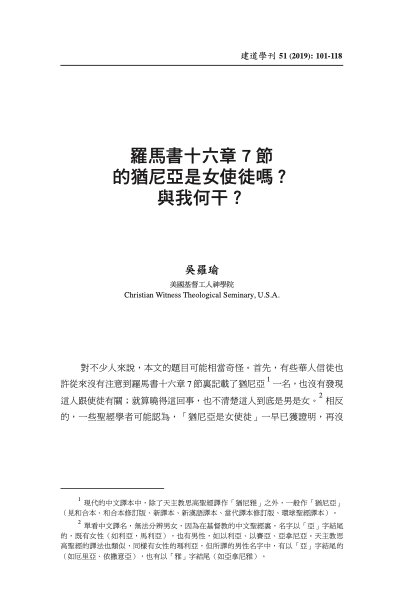羅馬書十六章 7 節的猶尼亞是女使徒嗎?與我何干?/吳羅瑜
吳羅瑜
撮要
今日多數學者認為,羅馬書十六章7節顯示猶尼亞是女使徒,但這立場其實有不少疑點:猶尼亞一名不一定源出拉丁文,有可能是對希伯來男人名字 yḥwny 的希臘文譯法。若不計算羅馬書十六章7節在內,第一世紀似乎沒有猶太女子採用猶尼亞一名字。從哥林多前書九章5節看來,保羅筆下的使徒是男性;另外也有證據顯示,有早期教父視猶尼亞為男性。「在使徒中有名望」這片語, 很可能指安多尼古和猶尼亞二人「為使徒所熟識、認許」。第一世紀的希臘—羅馬社會,早期正統教會,以至異端分子,一般都限制了女性在公開場合的角色,甚至連認為猶尼亞是女使徒的教父屈梭多模也不例外。既然保羅筆下的猶尼亞不一定是女士,也不確定是使徒,若引用猶尼亞的先例來為今日基督徒婦女爭取與男性領袖同等的事奉機會,似乎根基不穩。若聲稱猶尼亞被後人「變性」(由女變男),可能更是賦予他人莫須有的罪名。無論如何,今日基督徒婦女是否一定應該或需要跟男士凡事看齊,仍需在不同文化和處境中審慎探究如何解釋和應用聖經的記述和教訓,以致最終能榮耀神,建立教會,引人歸信基督。
ABSTRACT
There are cogent reasons to challenge the current consensus that Junia(s) in Rom 16:7 was a female apostle. The name probably did not derive from Latin, but was the Greek translation of the Hebrew masculine name yḥwny . Not counting Rom 16:7, apparently no first century Jewish woman bore the name Junia. Judging from 1 Cor 9:5, Paul regarded apostles as men, and some early church fathers viewed Junia(s) as male. The expression “notable among apostles” should preferably be translated “esteemed by the apostles.” First-century Greco-Roman society, the early orthodox church and even heretical sects all imposed restrictions on the public roles of women. Even Chrysostom who regarded Junia as a woman apostle was no exception. In view of uncertainties over the sex and apostolic status of Junia(s), it is inadvisable to appeal to Rom 16:7 as a historical precedent to advocate for equal ministry opportunities for women and men, or to charge various Christian leaders and institutions for the alleged “sex change” of the female Junia to a male named Junias due to androcentric bias. In any case, whether it is obligatory or necessary for Christian women to strive to be equal to men in all aspects is to be decided after careful exegesis and application of relevant biblical narratives and teachings in different cultural contexts and existential situations in order ultimately to glorify God, edify the Church and bring people to Christ.
原載於《建道學刊》51期(2019年1月),頁 101-118。
Latest Articles
新手牧者研究計劃(三):新手牧者的身心靈狀態 / 盧慧儀
2025 年 11 月 19 日
個體與關係:滕近輝思想中「深化」的靈性觀 / 倪步曉
2025 年 11 月 18 日
香港九龍塘基督教中華宣道會之起源和發展史/陳智衡
2025 年 10 月 20 日
Highlights
[電子書]困境與抉擇:「建道研究中心30週年誌慶」跨學科研討會論文集/廖炳堂、倪步曉主編
2025 年 1 月 2 日
從梧州到長洲:建道神學院125年的挑戰與恩典 / 陳智衡
2023 年 10 月 1 日
微小教會的見證/高銘謙
2023 年 6 月 1 日







